-
 Bitcoin
Bitcoin $82,099.5826
-1.34% -
 Ethereum
Ethereum $1,817.9545
-1.07% -
 Tether USDt
Tether USDt $0.9999
0.02% -
 XRP
XRP $2.0815
-3.96% -
 BNB
BNB $595.8647
-1.53% -
 Solana
Solana $124.0327
-0.92% -
 USDC
USDC $1.0000
0.01% -
 Dogecoin
Dogecoin $0.1634
-3.94% -
 Cardano
Cardano $0.6445
-4.65% -
 TRON
TRON $0.2336
1.34% -
 Toncoin
Toncoin $3.9381
2.61% -
 Chainlink
Chainlink $13.2201
-3.75% -
 UNUS SED LEO
UNUS SED LEO $9.0947
-5.84% -
 Stellar
Stellar $0.2646
-1.90% -
 Avalanche
Avalanche $18.6234
-3.91% -
 Shiba Inu
Shiba Inu $0.0...01214
-3.88% -
 Sui
Sui $2.2126
-6.78% -
 Hedera
Hedera $0.1604
-6.61% -
 Polkadot
Polkadot $4.0237
-1.97% -
 Litecoin
Litecoin $82.1655
-4.48% -
 MANTRA
MANTRA $6.2849
-1.13% -
 Bitcoin Cash
Bitcoin Cash $298.8203
-2.66% -
 Dai
Dai $1.0000
0.02% -
 Bitget Token
Bitget Token $4.4293
-4.57% -
 Ethena USDe
Ethena USDe $1.0000
0.01% -
 Pi
Pi $0.6976
-9.77% -
 Hyperliquid
Hyperliquid $12.5853
-0.74% -
 Monero
Monero $215.4717
-0.22% -
 Uniswap
Uniswap $5.8825
-1.85% -
 Aptos
Aptos $5.1958
-2.29%
How to enable notifications in Trust Wallet?
Trust Wallet notifications alert you to transactions, price changes, and security events; enable them on iOS via Settings or Android via Apps for real-time updates.
Mar 27, 2025 at 05:42 pm
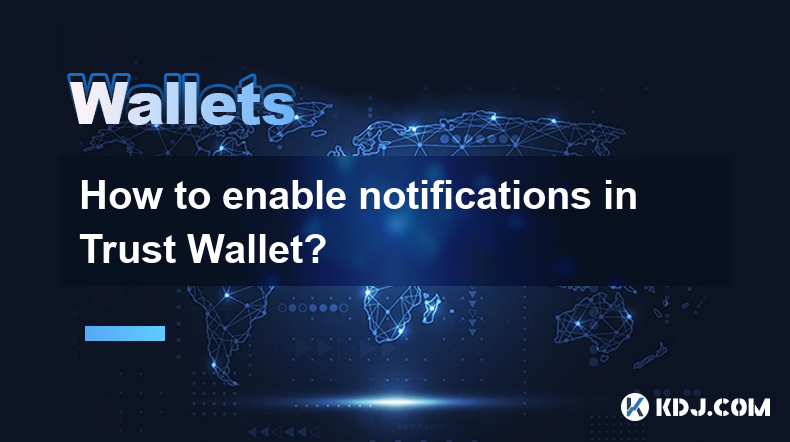
Understanding Trust Wallet Notifications
Trust Wallet, a popular mobile cryptocurrency wallet, offers notification features to keep you informed about crucial activities within your wallet. These notifications can alert you to incoming transactions, price changes of your holdings, and other important events. Enabling these notifications ensures you stay on top of your cryptocurrency assets and security. Failing to enable them could mean missing vital information, potentially impacting your financial situation. Understanding how to manage these settings is crucial for every Trust Wallet user.
Enabling Notifications on iOS (iPhone)
Enabling notifications on iOS devices involves navigating through your device's settings, not just the Trust Wallet app itself. This is a common security measure for many applications. The process is generally straightforward, but some users may find it slightly less intuitive than Android's approach. Here's how to do it:
- Open your iPhone's Settings app.
- Scroll down and tap on Trust Wallet.
- Ensure the Allow Notifications toggle is switched ON. This is the primary setting you need to enable.
- You can customize notification types (banners, sounds, etc.) within this menu. Explore the sub-options to tailor your notification preferences.
Enabling Notifications on Android
Android devices offer a slightly different approach to managing notifications. The process is usually located directly within the device's notification settings. Unlike iOS, the initial step isn't within the Trust Wallet app itself. Here's a step-by-step guide:
- Go to your Android device's Settings.
- Find Apps or Applications. This may vary depending on your Android version and device manufacturer.
- Locate Trust Wallet in the list of installed applications.
- Tap on Trust Wallet.
- Look for the Notifications section.
- Make sure the Notifications toggle is switched ON.
- You can further customize notification settings, such as choosing notification sounds and vibration patterns. Explore the sub-options to personalize your notification experience.
Troubleshooting Notification Issues
If you've followed the steps and are still not receiving notifications, several troubleshooting steps might help. These problems can range from simple settings oversights to more complex app-related issues.
- Check your phone's notification settings: Ensure that notifications aren't globally disabled on your device. Some phones have a "Do Not Disturb" mode or similar settings that might be silencing all notifications.
- Check your phone's battery optimization settings: Some power-saving modes might restrict background app activity, preventing Trust Wallet from sending notifications. You may need to exclude Trust Wallet from these restrictions.
- Restart your device: A simple restart often resolves minor software glitches that can interfere with notifications.
- Reinstall the app: If the problem persists, try reinstalling Trust Wallet. This can help fix any corrupted app files that might be causing the issue.
- Check for app updates: Make sure you're using the latest version of Trust Wallet. Updates often include bug fixes and performance improvements, which could resolve notification problems.
- Check your network connection: Ensure you have a stable internet connection. Notifications rely on a connection to send information to your device.
Customizing Notification Preferences
Once notifications are enabled, you can customize the types of alerts you receive. This allows you to prioritize the information that's most important to you. You can choose to receive notifications for specific events or even turn off certain notification categories altogether.
- Transaction Notifications: These alerts inform you about incoming and outgoing transactions from your wallet. This is crucial for monitoring your cryptocurrency activity. Ensure these are always enabled.
- Price Alerts: These notifications will alert you when the price of a specific cryptocurrency in your wallet reaches a certain threshold. This is useful for tracking your investments. These are highly recommended, especially for volatile assets.
- Security Alerts: These notifications warn you about potential security threats or suspicious activities related to your wallet. These are vital for maintaining the security of your funds.
- App Updates: These notifications inform you when a new version of the Trust Wallet app is available. Keeping your app updated is crucial for security and performance. Enable these to stay up-to-date with the latest security patches.
Understanding Notification Importance
Regularly checking your Trust Wallet notifications is crucial for maintaining control over your cryptocurrency holdings. Missing critical alerts could lead to missed opportunities or, more seriously, security breaches. Promptly addressing notifications can help you make informed decisions and protect your assets.
Why Aren't My Trust Wallet Notifications Working?
This is a common issue. The reasons can vary widely, from simple settings errors to more complex technical problems. First, verify that notifications are enabled both within the Trust Wallet app and in your device's system settings. Next, check your device's battery optimization settings – power-saving modes often restrict background app activity, preventing notifications. Reinstalling the app or restarting your phone might also resolve the problem. Finally, ensure a stable internet connection.
How Can I Customize My Trust Wallet Notifications?
Most Trust Wallet notification settings allow for customization. You can typically choose to receive alerts for specific events, such as incoming transactions, price changes, or security warnings. You can also adjust notification sounds, vibration patterns, and the frequency of alerts. These options usually reside within the notification settings menu accessible through your device's settings or within the Trust Wallet app itself (depending on your operating system).
What Types of Notifications Does Trust Wallet Offer?
Trust Wallet provides various notification types, including transaction confirmations (incoming and outgoing), price alerts (for assets you hold), security warnings (regarding suspicious activity), and app update notifications. These notifications are designed to keep you informed about significant events related to your cryptocurrency holdings and wallet security. The specific notification types available may vary slightly depending on your app version and device operating system.
Disclaimer:info@kdj.com
The information provided is not trading advice. kdj.com does not assume any responsibility for any investments made based on the information provided in this article. Cryptocurrencies are highly volatile and it is highly recommended that you invest with caution after thorough research!
If you believe that the content used on this website infringes your copyright, please contact us immediately (info@kdj.com) and we will delete it promptly.
- CZ Announces Plan to Donate 500 BNB Each to Myanmar and Thailand
- 2025-03-31 20:00:12
- Bitcoin (BTC -2.46%) has earned a place in almost every investor's portfolio.
- 2025-03-31 20:00:12
- Bitcoin (BTC) ETF Witnessed a Major Shift as Investors Pulled out $93 Million
- 2025-03-31 19:55:12
- Nigeria Accuses Binance of Facilitating Terrorism and Kidnapping Financing
- 2025-03-31 19:55:12
- A Sentiment Shift Appears Underway Within the XRP Community
- 2025-03-31 19:50:12
- A Quarter of S&P 500 Firms Could Be Holding Bitcoin on Their Balance Sheets by 2030: Report
- 2025-03-31 19:50:12
Related knowledge

How to easily generate a Bitcoin payment address
Mar 29,2025 at 10:49am
Generating a Bitcoin payment address might seem daunting, but it's actually quite straightforward. This process is crucial for receiving Bitcoin, as each transaction requires a unique address. Understanding how this works is fundamental to using Bitcoin effectively. This guide will walk you through the simple steps, regardless of your technical experti...
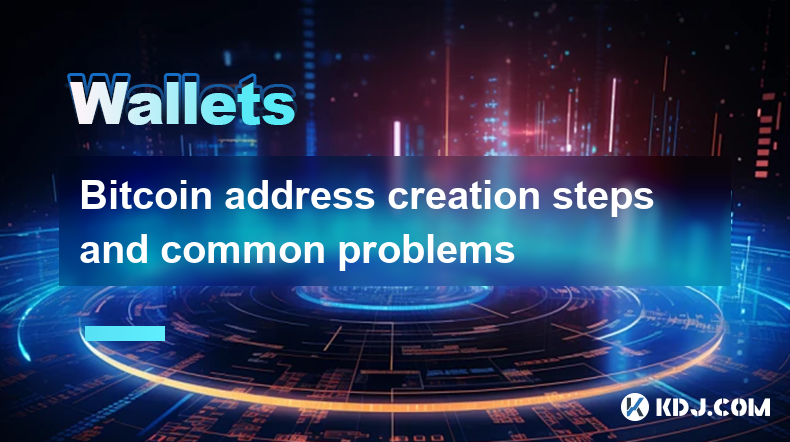
Bitcoin address creation steps and common problems
Mar 30,2025 at 06:07am
Understanding Bitcoin AddressesA Bitcoin address is a unique identifier, similar to a bank account number, used to receive Bitcoin. It's a string of alphanumeric characters generated from a public key, derived from your private key. Understanding the distinction between public and private keys is crucial for Bitcoin security. Your private key should be...
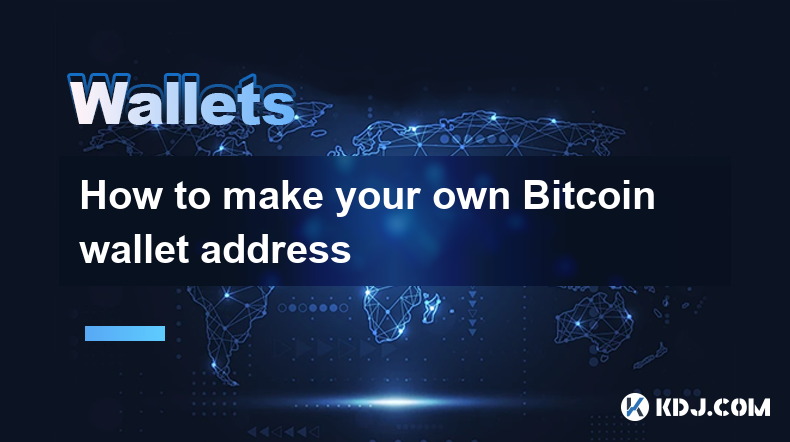
How to make your own Bitcoin wallet address
Mar 29,2025 at 08:42pm
Creating your own Bitcoin wallet address is crucial for securing and managing your Bitcoin holdings. It allows you to independently receive and send Bitcoin without relying on third-party services. This process involves understanding the different types of wallets and choosing the one that best suits your needs and technical expertise. Incorrectly gene...
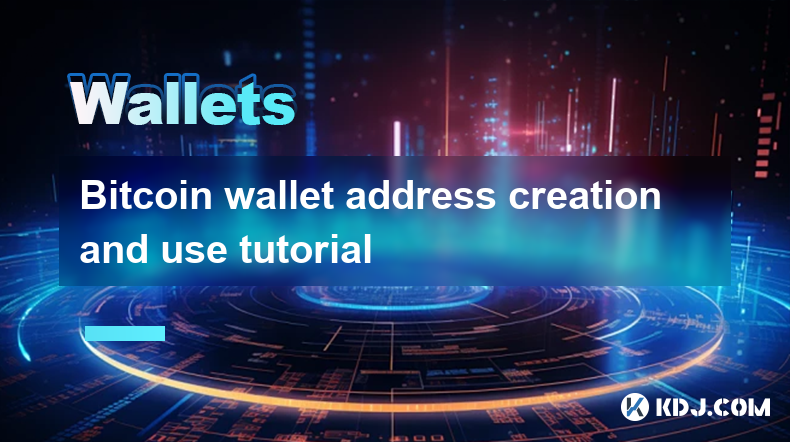
Bitcoin wallet address creation and use tutorial
Mar 29,2025 at 10:14pm
Understanding Bitcoin Wallet AddressesA Bitcoin wallet doesn't store Bitcoin in the way a traditional bank account does. Instead, it stores private keys, which are cryptographic secrets allowing you to access and spend your Bitcoin. Your Bitcoin address, on the other hand, is a public identifier, like an email address, that others can use to send you B...

Bitcoin address generation and secure storage guide
Mar 30,2025 at 08:07am
Understanding Bitcoin AddressesA Bitcoin address is essentially your public key, a string of alphanumeric characters used to receive Bitcoin. It's analogous to your bank account number. Unlike your private key, which is crucial for spending your Bitcoin, your address can be shared publicly without compromising your funds. Generating a new address is sim...
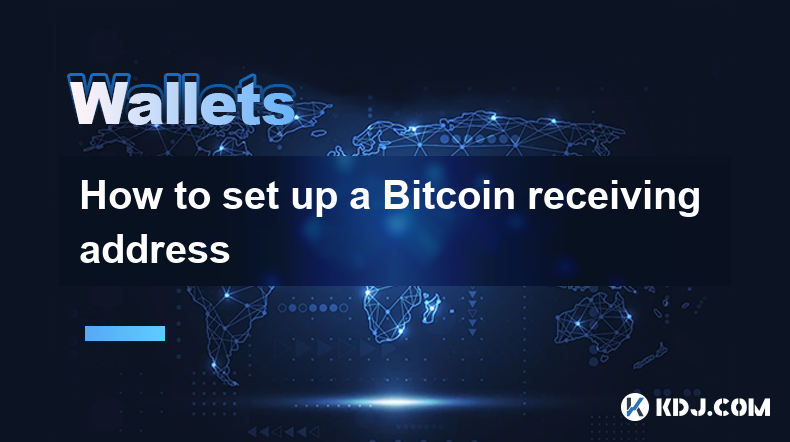
How to set up a Bitcoin receiving address
Mar 30,2025 at 06:14pm
Understanding Bitcoin Receiving AddressesA Bitcoin receiving address is essentially your unique identifier on the Bitcoin network. It's a string of alphanumeric characters that allows others to send Bitcoin to you. Think of it like your bank account number, but specifically for Bitcoin. You need a receiving address to receive Bitcoin. Crucially, you ca...

How to easily generate a Bitcoin payment address
Mar 29,2025 at 10:49am
Generating a Bitcoin payment address might seem daunting, but it's actually quite straightforward. This process is crucial for receiving Bitcoin, as each transaction requires a unique address. Understanding how this works is fundamental to using Bitcoin effectively. This guide will walk you through the simple steps, regardless of your technical experti...

Bitcoin address creation steps and common problems
Mar 30,2025 at 06:07am
Understanding Bitcoin AddressesA Bitcoin address is a unique identifier, similar to a bank account number, used to receive Bitcoin. It's a string of alphanumeric characters generated from a public key, derived from your private key. Understanding the distinction between public and private keys is crucial for Bitcoin security. Your private key should be...

How to make your own Bitcoin wallet address
Mar 29,2025 at 08:42pm
Creating your own Bitcoin wallet address is crucial for securing and managing your Bitcoin holdings. It allows you to independently receive and send Bitcoin without relying on third-party services. This process involves understanding the different types of wallets and choosing the one that best suits your needs and technical expertise. Incorrectly gene...

Bitcoin wallet address creation and use tutorial
Mar 29,2025 at 10:14pm
Understanding Bitcoin Wallet AddressesA Bitcoin wallet doesn't store Bitcoin in the way a traditional bank account does. Instead, it stores private keys, which are cryptographic secrets allowing you to access and spend your Bitcoin. Your Bitcoin address, on the other hand, is a public identifier, like an email address, that others can use to send you B...

Bitcoin address generation and secure storage guide
Mar 30,2025 at 08:07am
Understanding Bitcoin AddressesA Bitcoin address is essentially your public key, a string of alphanumeric characters used to receive Bitcoin. It's analogous to your bank account number. Unlike your private key, which is crucial for spending your Bitcoin, your address can be shared publicly without compromising your funds. Generating a new address is sim...

How to set up a Bitcoin receiving address
Mar 30,2025 at 06:14pm
Understanding Bitcoin Receiving AddressesA Bitcoin receiving address is essentially your unique identifier on the Bitcoin network. It's a string of alphanumeric characters that allows others to send Bitcoin to you. Think of it like your bank account number, but specifically for Bitcoin. You need a receiving address to receive Bitcoin. Crucially, you ca...
See all articles






















































































